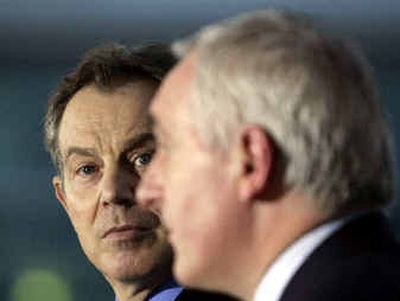British, Irish leaders say breakthrough near

BELFAST, Northern Ireland – The British and Irish prime ministers unveiled a sweeping new Northern Ireland peace plan Wednesday that offered solutions to issues – particularly Irish Republican Army disarmament – that have bedeviled negotiations for a decade.
The leaders’ optimism was offset, however, by statements from the two key parties in the conflict – the British Protestants of the Democratic Unionists, and the Irish Catholics of Sinn Fein – that they could not fully support the plan.
Each blamed the other for being unreasonable on the key stumbling block: whether the IRA should allow disarmament officials to photograph the destruction of the outlawed group’s remaining weapons stockpiles. Sinn Fein said the existence of such photographs would humiliate the IRA after decades of armed struggle.
British Prime Minister Tony Blair and his Irish counterpart, Bertie Ahern, appeared to side with Protestant demands for photos and held out hope the argument could be solved quickly so the wider plan still could be put into effect this month.
“What we’ve achieved is remarkable but not yet complete,” Blair said at a joint news conference with Ahern in Belfast.
He noted Protestants had demanded photos of IRA disarmament up front, while the IRA-linked Sinn Fein called for none at all. The governments’ compromise called for the photos to be taken but withheld from publication until Northern Ireland’s legislature elects a power-sharing administration led jointly by the Democratic Unionists and Sinn Fein.
Power-sharing was at the heart of Northern Ireland’s Good Friday accord of 1998 but collapsed two years ago after a moderate-led coalition suffered a series of breakdowns over IRA activity. Also, the moderates were voted out last year, greatly complicating efforts to revive the arrangement.
The United States expressed regret Wednesday that the key parties did not fully sign on to the deal.
“The settlement prepared by the governments and published today represents a balanced and reasonable solution,” State Department spokesman Adam Ereli said in Washington.